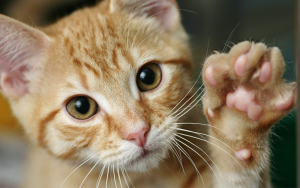How to Get Rid of Cat Pee Smell: The Ultimate Guide to a Fresh, Clean Home

If you’ve ever owned a cat, you know that one of the most challenging aspects of pet ownership is dealing with accidents, particularly when your feline friend decides to mark their territory inside the house. While cats are generally clean animals, occasional
accidents, especially when it comes to cat urine, can result in a persistent, unpleasant odor that can be difficult to remove. This article will guide you through the most effective methods for getting rid of cat pee smell, ensuring your home remains
fresh and welcoming.
Why Does Cat Pee Smell So Bad?
Before diving into solutions, it’s essential to understand why cat urine has such a potent and lingering odor. Cat urine is composed of water, urea, creatinine, uric acid, and ammonia. The ammonia in cat pee is what causes that strong, sharp smell. Additionally,
if the urine isn’t cleaned up promptly, uric acid crystals can form, which can cause the smell to intensify over time. It’s important to act quickly to minimize the odor and prevent it from becoming a long-term problem.
1. Act Quickly: Clean Up the Accident Immediately
The key to removing the cat urine odor is to clean it up as soon as possible. The longer the urine sits, the more time it has to soak into carpets, upholstery, and floors, making it much harder to eliminate the smell completely.
Steps to Clean Fresh Cat Pee
-
Blot the Area: Use paper towels or a clean cloth to blot up as much of the urine as possible. Press down gently to absorb the liquid but avoid rubbing the area, as this can push the urine deeper into the fibers or surface.
-
Rinse with Water: After blotting up the excess urine, rinse the area with clean, cool water. This helps dilute the urine and flush it out from the fibers. Blot again to remove as much water as possible.
-
Apply an Enzyme Cleaner: Enzyme-based cleaners are the gold standard when it comes to eliminating pet urine smells. These cleaners contain natural enzymes that break down the proteins in urine, neutralizing the odor at the molecular
level. Apply the enzyme cleaner generously to the affected area and let it sit for 10-15 minutes.
-
Let It Dry: After the enzyme cleaner has had time to work, allow the area to dry completely. This may take a few hours, depending on the size and depth of the stain. Avoid using a hairdryer or heater, as high heat can set the
stain.
-
Repeat If Necessary: If the odor persists, you may need to repeat the process. Sometimes, a second application of the enzyme cleaner is required to fully eliminate the smell.
2. Use Natural Remedies for Cat Pee Odor Removal
If you prefer to use natural, non-toxic methods for removing cat pee smell, several household products can do the job effectively.
Baking Soda and Vinegar Solution
Baking soda and vinegar are powerful cleaning agents that can neutralize odors and break down urine stains.
What You Need:
- White vinegar
- Baking soda
- Water
- A spray bottle
How to Use:
- Mix equal parts water and white vinegar in a spray bottle.
- Spray the solution onto the stained area, making sure to saturate it thoroughly.
- Let it sit for about 5-10 minutes.
- Blot the area with a clean cloth or paper towels to absorb the liquid.
- Sprinkle baking soda over the affected area while it’s still damp.
- Allow the baking soda to sit for a few hours or overnight.
- Vacuum up the baking soda, and the smell should be gone.
Hydrogen Peroxide Solution
Hydrogen peroxide is another effective solution for getting rid of cat pee smell. It has the dual benefit of deodorizing the area and disinfecting it.
What You Need:
- 3% hydrogen peroxide
- Baking soda
- Dish soap
How to Use:
- Mix one cup of hydrogen peroxide with two tablespoons of baking soda and a teaspoon of dish soap.
- Apply the mixture to the urine stain.
- Let it sit for 10-15 minutes, then blot the area dry with a clean cloth.
- Rinse with water if necessary.
3. Clean Your Carpets, Rugs, and Upholstery
If your cat has peed on carpets, rugs, or upholstery, you’ll need to be extra thorough in your cleaning efforts. These materials are highly absorbent, and without proper treatment, the urine smell can linger for weeks.
Carpet Cleaning Machines
A carpet cleaning machine, or steam cleaner, can be highly effective in removing both urine stains and odors. These machines use hot water and powerful suction to extract dirt, stains, and liquids from deep within the fibers. Be sure to use a cleaning
solution designed for pet urine, or make your own by mixing a few drops of dish soap with warm water.
Professional Cleaning Services
If you’re unable to remove the cat pee smell with at-home methods, consider hiring a professional cleaning service. Many carpet cleaners offer specialized pet odor removal services that target urine odors at their source.
4. Eliminate the Smell from Hard Floors
Cat urine can also leave a smell on tile, hardwood, or laminate floors. Unlike carpets, these surfaces are less absorbent but still need to be cleaned properly to prevent the odor from lingering.
- Use an Enzyme Cleaner: Enzyme cleaners are effective on all surfaces, including hard floors. Follow the same steps as you would for carpets.
- Mop with a Vinegar Solution: For a DIY solution, mix one part white vinegar with three parts water in a mop bucket. Mop the area thoroughly and allow it to air dry.
5. Prevent Future Accidents with Litter Box Solutions
To avoid future accidents, it’s essential to address any underlying reasons your cat may be urinating outside the litter box. Here are some tips to help prevent future messes:
Keep the Litter Box Clean
Cats are fastidious creatures, and a dirty litter box can be a major turnoff for them. Scoop the litter box daily, and change the litter regularly to keep it clean and odor-free.
Choose the Right Litter Box and Litter
Ensure that the litter box is large enough for your cat, and consider a high-sided box if your cat is prone to urinating outside the box. There are also different types of litter, such as clumping, non-clumping, and silica gel, which may be more appealing
to your cat.
Address Stress and Behavioral Issues
Cats may urinate outside the litter box due to stress, anxiety, or behavioral issues. If your cat is not spayed or neutered, consider having them fixed, as this can reduce territorial marking. Additionally, providing plenty of stimulation, toys, and hiding
spaces can help reduce anxiety.
Provide Multiple Litter Boxes
If you have more than one cat, it’s essential to provide enough litter boxes for everyone. The general rule is one litter box per cat, plus one extra.
6. Use an Air Purifier or Odor Absorber
To keep your home smelling fresh, consider using an air purifier with a HEPA filter or an odor absorber. These devices can help eliminate pet odors from the air, preventing them from settling into fabrics and upholstery.
Conclusion: Tackling Cat Pee Odor at Its Source
Dealing with cat pee smell can be frustrating, but with the right approach, you can restore your home to its fresh and clean state. The key is to act quickly, use the right cleaning products, and address the root cause of the problem—whether that’s an
unclean litter box, stress, or medical issues. Whether you choose commercial enzyme cleaners, natural remedies, or professional cleaning services, the steps outlined in this guide will help you get rid of the cat pee smell for good.
By taking these proactive measures, you’ll ensure that your home remains a pleasant environment for both you and your feline friend.
4o mini







